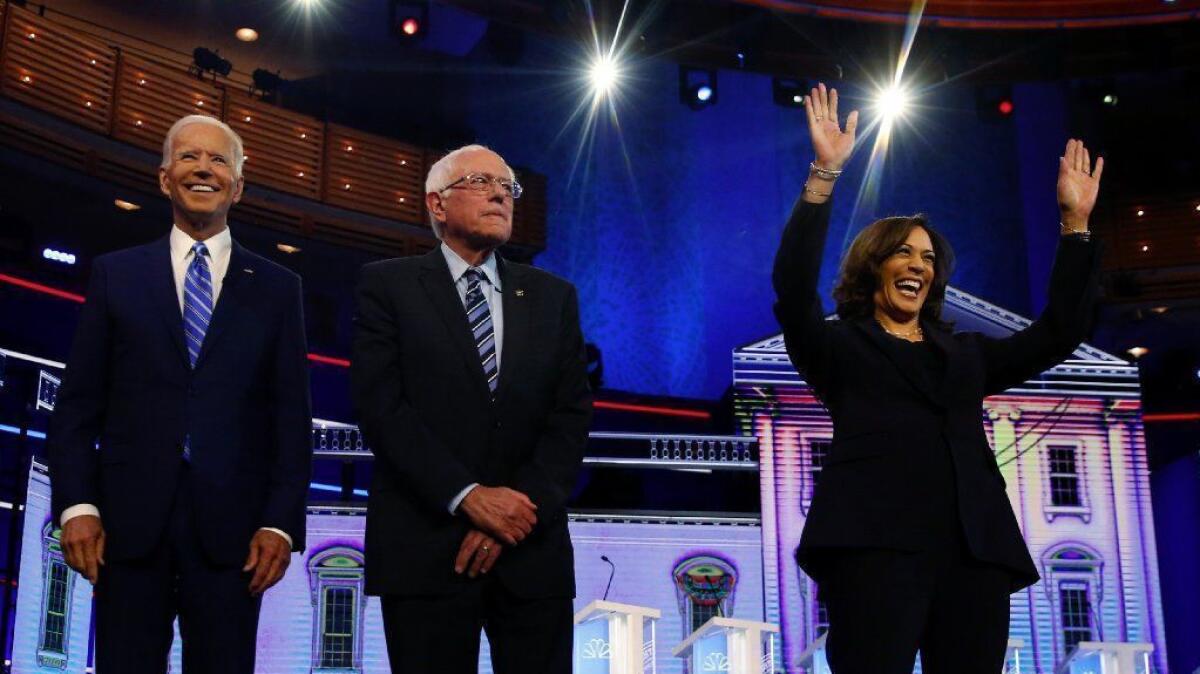Column: Yes, she stuck it to Biden, but Harris’ positions are tough to pin down

Who is the real Kamala Harris?
Ten days ago, the senator from California dominated the Democratic presidential debate when she excoriated Joe Biden for his opposition to mandatory busing to achieve school desegregation. Her poll ratings shot up; his sagged.
Then came the details. When reporters asked Harris if she supports federally mandated busing in 2019, she seemed to say no. Busing should be voluntary, a “tool that is in the toolbox” if school boards want to use it, she said last week.
“Absolutely right,” Biden replied; that’s his position too.
A consensus? Not so fast.
“We do not agree,” Harris insisted the next day. The real problem, she said, is that Biden has never admitted he was wrong to oppose busing in the 1970s.
Lesson One: Harris’s debate gambit wasn’t really about busing — not busing in 2019, anyway. It was mostly about knocking Biden down a peg by reminding voters of the baggage he carries from nearly half a century in politics, and elevating her profile in the process.
Lesson Two: Harris’ positions can be maddeningly elusive. She has staked out stances on some issues that sound bold, only to qualify them later. Her stances often seem designed to straddle the divisions in her party — to make her sound progressive enough for leftist voters but moderate enough for those in the center.
Take healthcare. Harris has endorsed Bernie Sanders’s “Medicare for All” proposal, a favorite on the progressive left. The bill would create a government-run health insurance system and eliminate all private health plans except for nonessential services such as cosmetic surgery.
In January, she seemed to endorse abolishing private insurance: “Let’s eliminate all of that,” she said. The next day, her staff backpedaled, saying she would accept a gradual transition to a government-run plan.
At last month’s debate, the pattern recurred. When candidates were asked if they would give up private health insurance for a government plan, Harris raised her hand. The next day, she said she had misunderstood the question and does not support abolishing private insurance.
Except she still does, at least implicitly. Harris has cosponsored four different healthcare bills, but she says Sanders’ “Medicare for All” is the one she prefers — and it would eliminate almost all private insurance.
Another example: Harris has endorsed the “Green New Deal,” the ambitious climate change plan proposed by Rep. Alexandria Ocasio Cortez (D-N.Y.). But Harris hasn’t embraced the plan’s most controversial features, such as a federal job guarantee for every working-age American. And she’s been silent on other leading proposals, including a federal carbon tax.
That’s left environmental groups unsure where she stands. Greenpeace rated her 12th among the Democratic candidates on a climate scorecard, behind Biden, Sanders and Elizabeth Warren. (Jay Inslee, the Washington state governor who has made climate change his signature issue, came in first.)
Harris spokeswoman Lily Adams told me the candidate “believes we need to take bold action on the climate crisis” and will offer a plan at some point, but didn’t provide a timetable.
Harris’ policy gymnastics have created a strategic ambiguity that could cut both ways.
Supporters may hear what they want to hear and discount the rest, giving her running room to appeal to the left now but shift to the center if she gets the nomination.
Critics will paint her as inconsistent, flexible on principles, even ruthless. But those complaints have been leveled against successful male politicians throughout history, from Franklin D. Roosevelt and Richard M. Nixon to Robert F. Kennedy and Bill Clinton.
Those traits might make Harris a candidate who can bridge her party’s left and center, as Clinton once did. But they also make her look like a politician whose core convictions are hard to pin down, as Clinton often was.
It’s a difficult strategy to pull off. Now that Harris has vaulted to the top echelon of candidates, she’s going to draw more scrutiny from the media and more attacks from her rivals.
But Harris’s campaign isn’t focused on any specific policy. She’s not running principally on economic inequality, healthcare, immigration or the environment, as some of her rivals are.
Instead, her core pitch to voters is her claim that she’s “a fighter,” a former prosecutor tough enough to take down President Trump just as she took Joe Biden down.
“We have a predator living in the White House,” she told voters in West Des Moines last week. “I’m prepared to prosecute the case.”
In her, Democrats face a familiar choice: do they want doctrinal purity — or a candidate who might be cagey enough to win?
Voters looking for clarity and consistence won’t find much here. But for voters thinking mostly about which candidate they’d like to see in a debate against Trump, Harris just made the first cut.
More to Read
Get the L.A. Times Politics newsletter
Deeply reported insights into legislation, politics and policy from Sacramento, Washington and beyond. In your inbox three times per week.
You may occasionally receive promotional content from the Los Angeles Times.







